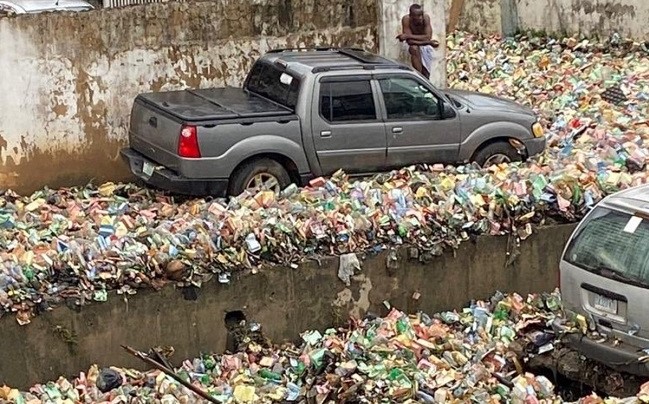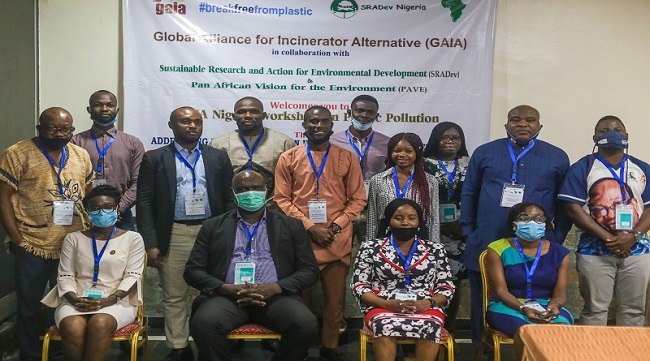A gathering of stakeholders comprising government, civil society and industry players who met in Lagos last week has called on the Nigerian government to urgently ban single-use plastic.

At a civil society’s perspective workshopto address plastic pollution in the country held courtesy of the Global Alliance for Incineration Alternatives (GAIA) from October 7 to 9, 2020 in Lagos, participants resolved that the ban should take effect from 2021 as against the current 2028 date as contained in the proposed National Policy on Plastic Waste Management.
According to the participants, the ban should start with products like styrofoam, microbeads and carrier bags as, according to them, these items have no economic value (recycling) potential.
At the workshop hosted by SRADev and PAVE under the auspices of GAIA Africa, delegates recommended that the proposed National Policy on Plastic Waste Management should be immediately adopted and approved by the Federal Executive Council (FEC) to give way to the promulgation of appropriate regulations on plastic waste management.
While underlining the need for referenceable disaggregated data on the quantity of plastic products being manufactured, used and imported in the country, the gathering called on civil society to fill the identified gaps in the proposed National Policy on Plastic Waste Management before its adoption by the Federal Executive Council.

Delegates further clamoured standard operating procedures/guidelines for the plastic recycling/management sector, adding: “The effectiveness of the management of plastics in Nigeria requires an inclusive approach which should entail the collaboration of different stakeholders at grassroots level including community, religious and political leaders.
“The government, civil societies and corporate bodies should take the lead to sensitise the general public on the public health implications of plastic waste.”
The forum had earlier described plastic pollution as a global menace throughout its entire lifecycle, with health and environmental implications which includes cancers, endocrine disruption, diabetes, obesity, developmental issues, reproductive dysfunction, and respiratory diseases, among others.
It disclosed that Nigeria is ranked the sixth highest country producing unmanaged plastic, and that several countries including developing ones are making effort to change the narrative through banning, production and importation of single use plastics.
It lamented a lack of sufficient data to quantify the contribution of the big polluters, adding that field experience indicates a gap in the current private sector recycling processes especially collection, compared to the magnitude of the menace of plastics pollution.
GAIA comprises the Centre for Earth Works (CFEW), Green Knowledge Foundation (GKF), Pan African Vision for the Environment (PAVE), Environmental Rights Action (ERA) and Sustainable Research and Action for Environmental Development (SRADev Nigeria).
The objectives of the workshop were listed to include:
- Connect the various GAIA and #breakfreefromplastic members in the country.
- Educate, orient, synergize and enable NGOs to provide updates and promote information sharing on priority issues and existing opportunities.
- Address how GAIA members can coordinate towards developing National Action Plans (NAPs) on the plastic issues in Nigeria.
During the opening of the workshop, the Deputy Director, Federal Ministry of Environment, Mr. Oladipo J.O., congratulated the civil society group, adding that plastic management is very important to the Nigeria economy. He disclosed that the National Policy on Plastic Waste Management has been transmitted to the Federal Executive Council for approval.
In his goodwill message, Commissioner for Environment and Water Resources, Lagos State, Mr. Tunji Bello, represented Mr. Adeoye Babajide, a Director in the Ministry, said plastic is a burning issue not only in Nigeria but across the world. He said the state government is working to address the issue as it affects free flow of water in drainages in the state and leading to flooding.
He said the current crisis cannot be allowed to linger, adding: “We are working on a policy that will ensure proper management of plastic”.
Professor of Chemistry, Babajide Alo of the University of Lagos, in a goodwill message, expressed delight on the initiative of GAIA Nigeria to address plastic pollution. He described it as a welcome development that will raise awareness about plastics.
He added that, through the advocacy, the National Policy on Plastic Waste Management of the government would see the light of the day.
Chibueze Ebii of Heinrich Boll Foundation, Abuja said the Foundation is looking for people to work with to address the plastic crisis.
